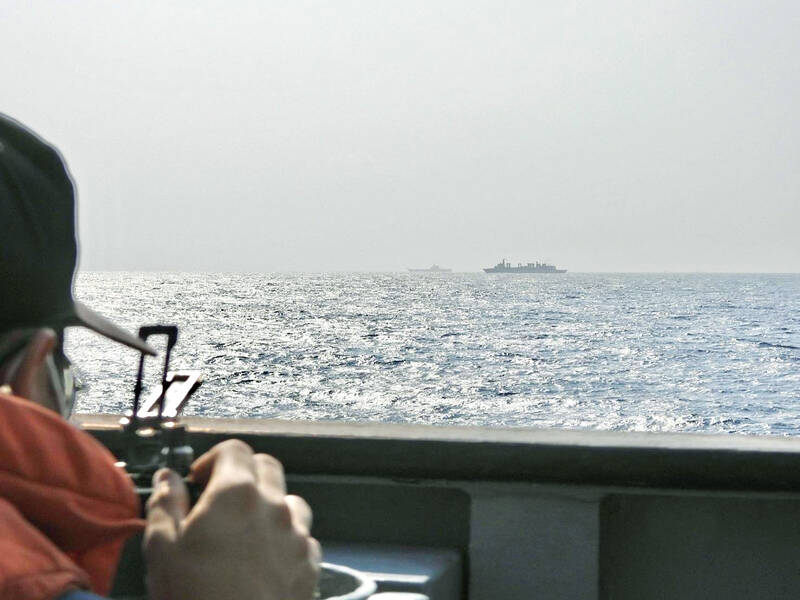The military is closely watching a Chinese drill in the Taiwan Strait that began yesterday morning, ahead of a scheduled meeting between President Tsai Ing-wen (蔡英文) and US House of Representatives Speaker Kevin McCarthy in California.
Beijing said the drill is a “joint cruise and patrol special operation” led by a patrol vessel.
The Ministry of National Defense said Taiwanese forces are monitoring Chinese activity in the Strait through joint intelligence and surveillance, adding that no irregularities had been detected.

Photo courtesy of Ministry of National Defense
The exercises are led by the Haixun 06 (海巡06), the first large Chinese vessel designated to patrol the Strait, joined by an undetermined number of maritime police vessels, China Central Television (CCTV) reported.
The report did not specify the exact location of the drill and when it would end, saying only that it was being held in the northern and central parts of the Strait.
NAUTICAL CHART

Photo courtesy of Ministry of National Defense
However, a nautical chart attached to the report suggests that the drill might not be limited to the Strait.
The chart highlights two areas east and southeast of eastern Taiwan, without identifying what they represent.
Chinese-language media reported that the two areas are among those that were targeted by missiles during exercises that Beijing launched following then-US House speaker Nancy Pelosi’s visit to Taipei in August last year.
Separately, the ministry reported that 14 Chinese military jets and three warships had been detected around Taiwan from 6pm on Tuesday to 6am yesterday.
Two of the aircraft entered Taiwan’s air defense identification zone, the ministry said.
One of them was a Harbin BZK-005, a high-altitude, long-range uncrewed aerial vehicle used for reconnaissance purposes and the other was a Y-8 anti-submarine warfare plane, it said.
However, no Chinese military aircraft took the more provocative step of crossing the median line of the Taiwan Strait, the ministry said, adding that the number and routes of flights were similar to Chinese air force movements in the past few weeks.

Taiwan is projected to lose a working-age population of about 6.67 million people in two waves of retirement in the coming years, as the nation confronts accelerating demographic decline and a shortage of younger workers to take their place, the Ministry of the Interior said. Taiwan experienced its largest baby boom between 1958 and 1966, when the population grew by 3.78 million, followed by a second surge of 2.89 million between 1976 and 1982, ministry data showed. In 2023, the first of those baby boom generations — those born in the late 1950s and early 1960s — began to enter retirement, triggering

ECONOMIC BOOST: Should the more than 23 million people eligible for the NT$10,000 handouts spend them the same way as in 2023, GDP could rise 0.5 percent, an official said Universal cash handouts of NT$10,000 (US$330) are to be disbursed late next month at the earliest — including to permanent residents and foreign residents married to Taiwanese — pending legislative approval, the Ministry of Finance said yesterday. The Executive Yuan yesterday approved the Special Act for Strengthening Economic, Social and National Security Resilience in Response to International Circumstances (因應國際情勢強化經濟社會及民生國安韌性特別條例). The NT$550 billion special budget includes NT$236 billion for the cash handouts, plus an additional NT$20 billion set aside as reserve funds, expected to be used to support industries. Handouts might begin one month after the bill is promulgated and would be completed within

NO CHANGE: The TRA makes clear that the US does not consider the status of Taiwan to have been determined by WWII-era documents, a former AIT deputy director said The American Institute in Taiwan’s (AIT) comments that World War-II era documents do not determine Taiwan’s political status accurately conveyed the US’ stance, the US Department of State said. An AIT spokesperson on Saturday said that a Chinese official mischaracterized World War II-era documents as stating that Taiwan was ceded to the China. The remarks from the US’ de facto embassy in Taiwan drew criticism from the Ma Ying-jeou Foundation, whose director said the comments put Taiwan in danger. The Chinese-language United Daily News yesterday reported that a US State Department spokesperson confirmed the AIT’s position. They added that the US would continue to

The National Development Council (NDC) yesterday unveiled details of new regulations that ease restrictions on foreigners working or living in Taiwan, as part of a bid to attract skilled workers from abroad. The regulations, which could go into effect in the first quarter of next year, stem from amendments to the Act for the Recruitment and Employment of Foreign Professionals (外國專業人才延攬及僱用法) passed by lawmakers on Aug. 29. Students categorized as “overseas compatriots” would be allowed to stay and work in Taiwan in the two years after their graduation without obtaining additional permits, doing away with the evaluation process that is currently required,